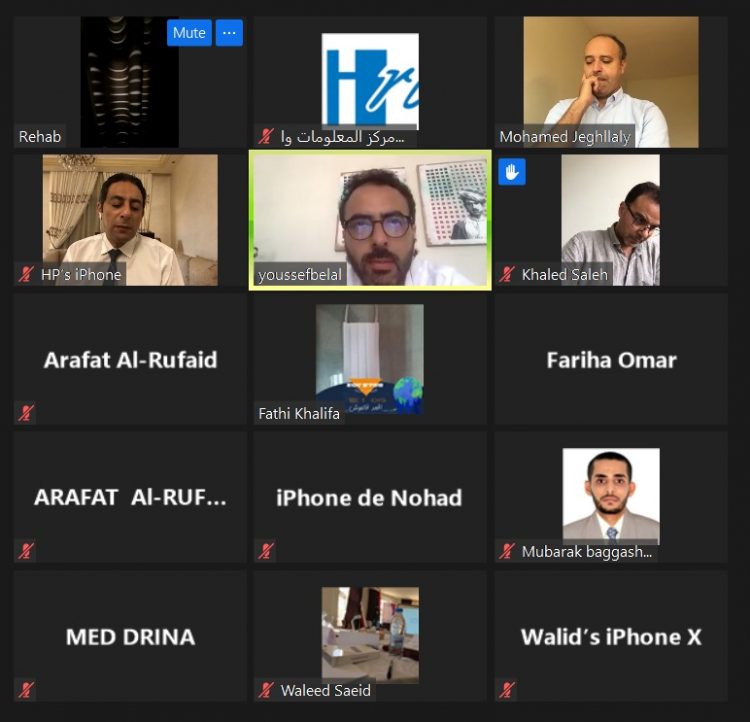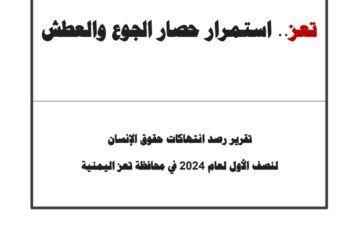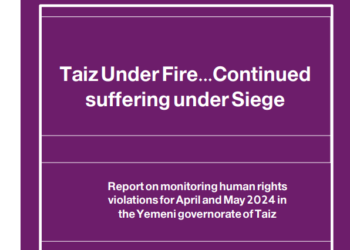International experts stress the importance of the principle of accountability to protect human rights in Libya
Taiz – Private
Activists and experts in the field of human rights in Libya confirmed that Libya suffers from a continuous human rights haemorrhage for years, and the first of these violations is the right to life.
Representatives of the human rights movement and the Libyan civil society said in a symposium organized today by the Human Rights Information and Training Center (HRITC) that the violations in Libya are continuing and it is not a secret. There is even a boldness and a challenge from some parties to document their violations, such as unlawful killings or torture.
The activists who represent different viewpoints in Libya agreed that the human rights activist in Libya is not only confronting a state or its substitute, government employees, or anyone claiming some public authority. But in confrontations with societal institutions and several social components.
Interventions involving experts representing the United Nations, regional organizations and bodies indicated that human rights violations in Libya involve a part of civil societies and the political elite that do not perform their duties or collude with the de facto forces.
Besides stated in the symposium that comes within the programs of supporting the human rights and peace-building process of the Human Rights Information and Training Center (HRITC), which is a regional organization that has consultative status with the Economic and Social Council at the United Nations,
Human rights activism in Libya is fraught with real dangers, which represent a serious challenge to human rights actors and place them in the face of local narratives that encourage war and fighting and hide behind various reasons.
The participants emphasized that the human rights defender in Libya is facing his society that has not yet absorbed the culture of human rights or deals with it selectively.
The seminar, which lasted for nearly three hours, and with in-depth interventions by specialized participants, was conducted through the technique of visual communication in the application of the Zoom program, that the main problem is not only dealing with cases of human rights violations. Also with the absence of the state, the prestige of the law, and the monopoly of legitimate power, which leads to the absence of accountability and to the prevalence of de facto forces, for which there is no law deterrent and accustomed to impunity and the absence of accountability.
The seminar, moderated by the human rights defender and peace-building expert in Libya, Dr Muhammad Al-Jaghali
And it speaks of:
Dr Youssef Bilal– Senior Political Adviser at the United Nations Mission
Fariha Al-Hudairi– Member of Parliament
Dr Rehab Mohamed – Professor of Tripoli University in Public Law
Khaled Al-Aqili– Human Rights Solidarity Organization
Kamal Hudhaifa– Adviser at the Ministry of Justice
Fathy Khalifa– Chairman of the Umma Party
Walid Al-Hudairi – Director of the Office of International Relations and Cooperation at the National Committee for Human Rights in Libya
In concluded that the path of improving the human rights situation requires the acceleration of finding a solution to the political division, unifying state institutions and limiting the proliferation of weapons.
The symposium also confirmed that the violations are also the actions of external parties, whether states or military groups, private security organizations, or through the export of weapons or financing their acquisition.
Eventually, the need to activate the role of the United Nations and make a greater effort alongside its role in monitoring and documentation by enhancing due diligence for its local partners to respect human rights standards.
__
Human Rights Information and Training Center – Taiz
29 – 8 – 2020








